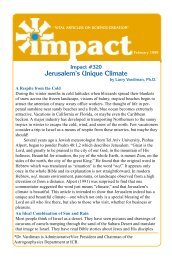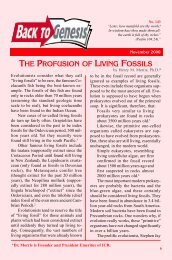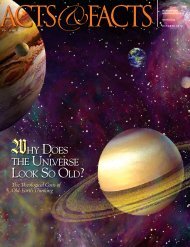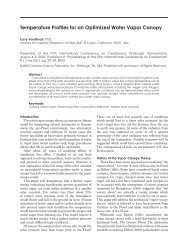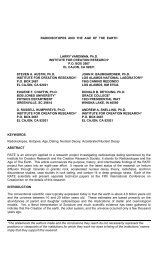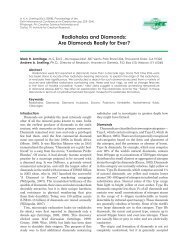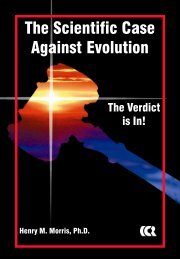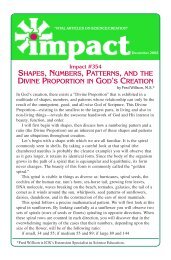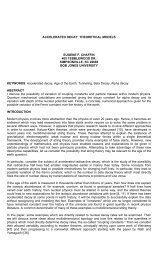Download September 2008 PDF - The Institute for Creation Research
Download September 2008 PDF - The Institute for Creation Research
Download September 2008 PDF - The Institute for Creation Research
You also want an ePaper? Increase the reach of your titles
YUMPU automatically turns print PDFs into web optimized ePapers that Google loves.
Empiricism:A Glaring Flawof New AtheismB R I A N T H O M A S , M . S .Atheism is a worldview in which there is no God. Adherentsbelieve that life sprang from natural <strong>for</strong>ces, not anintelligence, and that the cosmos made itself—or atleast organized itself out of raw materials that werejust there. “New atheists” include Richard Dawkins, author of <strong>The</strong>God Delusion; Christopher Hitchens, who wrote God Is Not Great:How Religion Poisons Everything; and Sam Harris, with <strong>The</strong> End ofFaith: Religion, Terror, and the Future of Reason. <strong>The</strong>ir bestselling booksare characterized by vitriolic disdain <strong>for</strong> those who believe in God.<strong>The</strong> new atheists do not restrict themselves to passive disbelief.Rather, they actively admonish others to not believe in God, and takestrong steps to rid the world of its “contemptible” acknowledgementof any deity, and especially of theism. 1 As Dawkins said, “I do everythingin my power to warn people against faith itself.” 2An ironic feature of new atheism is its strong faith in the inferiorityof having faith. Be<strong>for</strong>e they attack it, new atheists first redefinefaith to mean “belief without evidence.” <strong>The</strong>n they limit evidenceto that which can be tested through empirical science. 3 This isabsurd, like requiring an experiment to prove a father’s love <strong>for</strong>his children. Just as we use our senses, logic, and circumstantialevidence to deduce the truth of a father’s love, we can discoverGod through non-empirical means.New atheists believe that empirical science is the truepath to understanding. However, since the very concept of“empiricism”—that science is the only way to “know” something—isnot itself a product of any scientific experiment, itdistills to a faith after all. Faith is not “belief without evidence,”but rather a decision to reckon as true (actual or real) somethingthat is not visible. Empiricism is an idea. Ideas are not visible.New atheists there<strong>for</strong>e have strong faith, though not in God. 4Many popular philosophies are self-refuting, whichmeans that they do not meet their own standards and thus selfdestruct.5 One example of a self-refuting claim is the commonstatement “all truth is relative.” This cannot be. If all truth is relative,then the supposed truth that “all truth is relative” woulditself be relative, and there<strong>for</strong>e not true. Consider the assertion“we cannot ultimately grasp meaning in an absolute way.” If thatwere true, then one would not be able to grasp the meaning ofthat very statement.A good way to deal with self-refuting truth claims isto ask honest questions about them. For example, a responseto the assertion “all truth is relative” could be to ask, “So, is thatrelatively true?” Likewise, one who denies that truth is knowablecould be questioned with, “How can we then know <strong>for</strong> sure that truthcannot be surely known?”Empiricism is also self-refuting, and there<strong>for</strong>e should not be believed.Its essence could be stated as “experimental science is the onlyway to know something <strong>for</strong> sure.” We might then ask, “What was thescientific experiment that demonstrated that experimental science is theonly way to know something <strong>for</strong> sure?”In contrast to the self-refuting doctrines that atheism must holdto, theism is aligned with the reality of a transcendent and necessaryBeing; not, as new atheists claim, with a fairy tale. Biblical theismbegins with the sensible concept, assumed in Genesis, of an infiniteCreator who <strong>for</strong>med a finite creation. Knowledge of our holyGod is generally available through our observation of the naturalworld. This is enough to reveal man’s sin-induced separation fromHim. 6 However, only the Bible reveals that He has per<strong>for</strong>med thenecessary work to reconcile us back to Himself through His SonJesus Christ, and <strong>for</strong> His glory. 7 So based on the evidence of whatHe has made and done, we can believe in and know Him.References1. <strong>The</strong>ism is a worldview that holds that there is one God who exists outside theuniverse and who created and sustains the universe. <strong>The</strong> three theistic religionsare Judaism, Islam, and Christianity.2. Dawkins, R. 2006. <strong>The</strong> God Delusion. Boston: Houghton-Mifflin, 306.3. Empirical science uses the scientific method, and is there<strong>for</strong>e limited to investigatingrepeatable events in the physical realm.4. Geisler, N., and F. Turek. 2004. I Don’t HaveEnough Faith to Be an Atheist. Wheaton, IL:Crossway Books, 25-27.5. Ibid, 38-41.6. Romans 1:20.7. 2 Corinthians 5:18.Mr. Thomas is Science Writer.SEPTEMBER <strong>2008</strong> • ACTS&FACTS15



